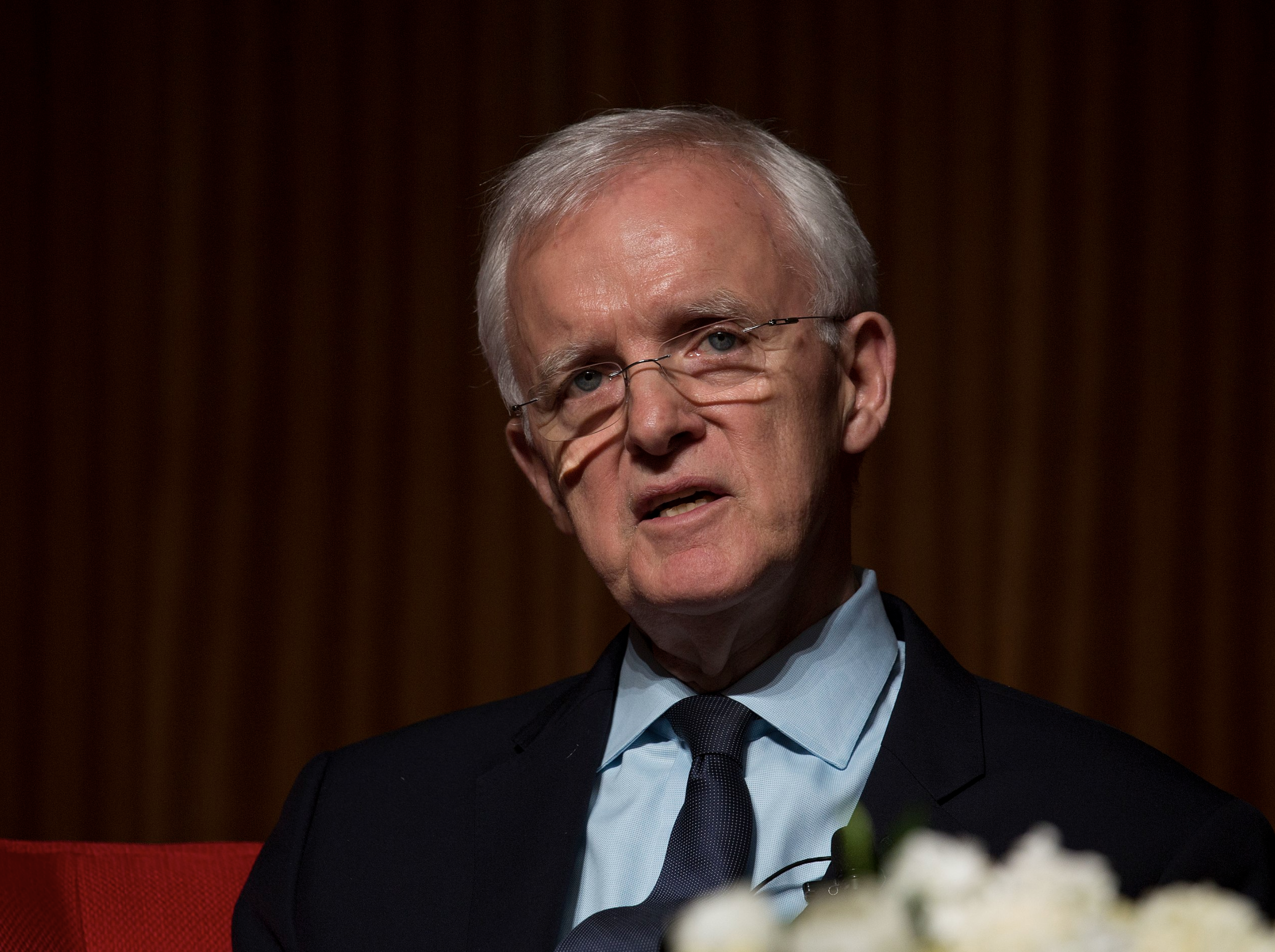Former Senator Bob Kerrey Coming to Santa Barbara
Impeachment, Political Polarization, and America's Role Among Topics at Capps Project

Over the course of his life, Bob Kerrey has worn many hats. He’s served as a governor of Nebraska, a United States senator, and a Navy SEAL in the Vietnam War. He’s also been a close friend and strong supporter of the political ambitions of the Capps family and was one of the first people to push Walter Capps to run for Congress. Earlier, he was a featured lecturer for a class taught by Walter Capps about Vietnam. The class was one of the first in the nation to discuss the healing that members of the military go through after returning home as they seek to grapple with the trauma that they’ve witnessed, both as victims and inflictors of pain and violence.
It’s a topic that is especially applicable to Kerrey, who was accused of committing war crimes during his time as a SEAL in Vietnam. In 2016, then-Secretary of State John Kerry, himself a Vietnam veteran, announced that Kerrey would be the chair of the Board of Trustees for the newly opened Fulbright University Vietnam. Substantial backlash ensued over allegations, unearthed by the The New York Times Magazine and 60 Minutes in 2001, that Kerrey and his SEAL team, known as “Kerrey’s Raiders,” rounded up and massacred around two dozen civilians, including women and children, in the small village of Thanh Phong in 1969. Kerrey disputes the allegations, insisting his team was initially fired upon and that the killing of civilians was unintentional.
Kerrey will be visiting Santa Barbara to attend an event this Saturday, December 7, in support of the Capps Project, which focuses on bridging gaps between people with different views and backgrounds. Ahead of his appearance, he spoke with the Santa Barbara Independent about America’s role in the world, political polarization, and impeachment. The conversation has been edited for clarity and length.
President Trump has intervened on behalf of SEAL Eddie Gallagher, who was accused of stabbing an injured and unarmed prisoner of war to death and taking a selfie with the corpse. This isn’t the first time a president has issued such a pardon: President Nixon pardoned William Caley in the My Lai Massacre, for example. As a former special forces member, what message does this send? Should Americans be concerned? I think it sends a message, basically, that he’s sympathetic to [Gallagher]. What disturbs me most is that he’s interfering with the military justice process, which is meant to balance fairness and discipline. It’s a different process than the justice system in place for civilians, and when someone like the president intervenes, it makes it less likely that it will run smoothly and do its job. There’s a code of conduct you accept when you join the military, and while it may not always produce the results you want, or the results you think are “fair,” it’s what you signed up for.
Why do you think the president chose to interfere? I think that Fox News basically turned it into a cause, and that his base cared about it, and he chose to act to satisfy his political base. He did what the media asked him to do.
Does this issue have personal resonance for you because, during your time in Vietnam, your unit was accused of rounding up and killing civilians in a village? You’ve said in dispute that you were initially fired upon and that the killing of civilians was unintentional. Have you ever been back? Well, I disagree with the way you’ve just characterized the events that occured, but I won’t get into that. No, I haven’t ever been back to that village, but I’ve been back to Vietnam many times. I was very involved there in my capacity with Fulbright University Vietnam.
Do you think there’s a culture of impunity in the elite special forces units? No, I don’t think there’s a “culture of impunity.” I think if anything bothers me, it’s that there’s a belief that SEALS can be given any problem, can do anything. It’s not up to the SEALS to fix every problem that we have, so I worry about them being overburdened.
The use of special forces has expanded around the world in the past decades; they’re in 70 percent of the world’s countries. Does that worry you? No, not really. I think it makes a lot of sense. Basically what happened is that a small but very lethal group of radical Islamists declared war on the United States. If we don’t do anything to stop them from attacking us, that’s exactly what they’ll do. We didn’t declare war on them; they declared war on us. And what that effort against those groups is going to look like is different than the wars we’ve seen in the past, because it’s something new and different. We’re not fighting a nation state, what we’re fighting is basically the fact that radical Islam has been declaring war on the West. And it wouldn’t be feasible, politically, to have big ground forces in all of the countries where these groups operate. So I think it makes a lot of sense.
American intervention has often led to anti-Americanism. For instance, when the U.S. intervened in Afghanistan in the ’80s, the local backlash led to the rise of the Taliban. Look, the United States has to make difficult decisions. And do we always get it right? No. But to say that American intervention is responsible for these groups? For things like ISIS? I don’t believe that’s right.
America has been at war in Afghanistan since September 2001. As someone who’s seen war firsthand, are Americans becoming detached from war? I think that civilians have always been kind of detached from war. That was true in Vietnam; that was true in World War I. Soldiers have always had a hard time coming back from war, because back at home people are unaware of everything that’s happening. I think that under President Trump, if he gets a second term, we’ll pull out of Afghanistan. If you want to see America pull back from its role in the world, that’s what he wants to do. Some people just want to say, “It’s not our problem!” This whole “endless war” story seems to miss a lot, I think.
It’s been 18 years of fighting in Afghanistan for the U.S., and the Taliban is in negotiations now. Has our approach been effective? Well, ask the women of Afghanistan how they feel about that, about the government negotiating with the Taliban. I’m not sure I buy the idea that things would be better if we just left, or if we were less involved in the world.
A lot of people say America is “more divided than ever,” but the ’60s, and in particular the Vietnam War, were an extremely polarized and contentious time in American history. Do both sides bear responsibility for polarization in our current moment? Well, first off, the primary cause of division in the ’60s wasn’t Vietnam; it was race. There was a fundamental struggle going on in the country — over things like busing, over things like desegregation, over things like civil rights. In 1971 I think there were something like 2,000 bombings, by groups like Weather Underground and whatnot, so it was an extremely volatile time. I think today it’s hard to say that, on things like impeachment, both sides bear equal responsibility. I think there are areas where Republicans have made it very hard to find common ground, especially since the Tea Party took the GOP in a very rightward direction.
One common talking point surrounding impeachment is that it will hurt Dems in red states. As the former governor of a pretty red state, do you think this is true? I think that’s hard to answer. But I think both parties will feel the consequences, will lose seats over their position on impeachment. But I personally think that we’re in a situation where there are grounds for impeachment, and I think it’s a really dangerous game that Republicans are playing, more or less giving Trump a pass on his behavior. When people like Devin Nunes say, “Ukraine intervened in our election!” that’s a lie. And when people shrug and say things like, “That’s just what Donald Trump does,” no, that’s not “just what Donald Trump does” — that’s the fucking president of the United States!
Democracy, you know, it isn’t a given. You have to maintain it. And you need a citizenry that can evaluate claims, can decide that some things are true and some aren’t. Social media has made it easier to spread disinformation, but for big-name Republicans to be spreading lies about Ukraine intervening in our election, to be disputing that Russia interfered in our election, that’s disturbing. Mitt Romney came out the other day and stated unequivocally “Ukraine didn’t intervene in our election.” But the fact that I can only name one Republican that stood up and clarified the truth on that is worrying.
You were a candidate for the democratic nomination in 1992. Any current favorites for 2020? I’m supporting Joe Biden, but I like Pete Buttigieg a lot. It’s encouraging to me to see young people going into politics. A lot of young people now, they seem to have a lot of optimism, they seem to be getting involved. And I think that’s great.



